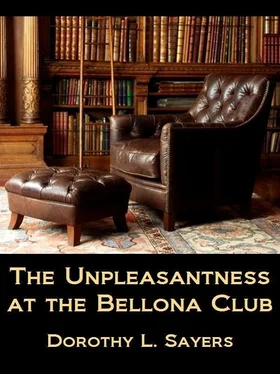“I have not mentioned, I think, how I come to be involved in this matter myself.
My father was the Fentimans’ family solicitor, a position to which I naturally succeeded when I took over the business at his death. General Fentiman, though he had little enough to leave, was not the sort of disorderly person who dies without making a proper testamentary disposition, His retired pension, of course, died with him, but his small private estate was properly disposed by will. There was a small legacy — fifty pounds — to his manservant (a very attached and superior fellow); then one or two trifling bequests to old military friends and the servants at the Bellona Club (rings, medals, weapons and small sums of a few pounds each).
Then came the bulk of his estate, about £2,000, invested in sound securities, and bringing in an income of slightly over £100 per annum. These securities, specifically named and enumerated, were left to Captain George Fentiman, the younger grandson, in a very proper clause, which stated that the testator intended no slight in thus passing over the elder one, Major Robert, but that, as George stood in the greater need of monetary help, being disabled, married, and so forth, whereas his brother had his profession and was without ties, George’s greater necessity gave him the better claim to such money as there was. Robert was finally named as executor and residuary legatee, thus succeeding to all such personal effects and monies as were not specifically devised elsewhere. Is that clear?”
“Clear as a bell. Was Robert satisfied with that arrangement?”
“Oh dear, yes; perfectly. He knew all about the will beforehand and had agreed that it was quite fair and right.”
“Nevertheless,” said Wimsey, “it appears to be such a small matter, on the face of it, that you must be concealing something perfectly devastating up your sleeve. Out with it, man, out with it! Whatever the shock may be, I am braced to bear it.”
“The shock,” said Mr. Murbles, “was inflicted on me, personally, last Friday by Lady Dormer’s man of business — Mr. Pritchard of Lincoln’s Inn. He wrote to me, asking if I could inform him of the exact hour and minute of General Fentiman’s decease. I replied, of course, that, owing to the peculiar circumstances under which the event took place, I was unable to answer his question as precisely as I could have wished, but that I understood Dr. Penberthy to have given it as his opinion that the General had died some time in the forenoon of November 11th. Mr. Pritchard then asked if he might wait upon me without delay, as the matter he had to discuss was of the most urgent importance. Accordingly I appointed a time for the interview on Monday afternoon, and when Mr. Pritchard arrived he informed me of the following particulars.
“A good many years before her death, Lady Dormer — who, as I said before, was an eminently generous-minded woman — made a will. Her husband and her daughter were then dead. Henry Dormer had few relations, and all of them were fairly wealthy people. By his own will he had sufficiently provided for these persons, and had left the remainder of his property, amounting to something like seven hundred thousand pounds, to his wife, with the express stipulation that she was to consider it as her own, to do what she liked with, without any restriction whatsoever. Accordingly, Lady Dormer’s will divided this very handsome fortune — apart from certain charitable and personal bequests with which I need not trouble you — between the people who, for one reason and another, had the greatest claims on her affection. Twelve thousand pounds were to go to Miss Ann Dorland.
The whole of the remainder was to pass to her brother, General Fentiman, if he was still living at her death. If, on the other hand, he should pre-decease her, the conditions were reversed. In that case, the bulk of the money came to Miss Dorland, and fifteen thousand pounds were to be equally divided between Major Robert Fentiman and his brother George.”
Wimsey whistled softly.
“I quite agree with you,” said Mr. Murbles. “It is a most awkward situation. Lady Dormer died at precisely 10:37 a.m. on November 11th. General Fentiman died that same morning at some time, presumably after 10 o’clock, which was his usual hour for arriving at the Club, and certainly before 7 p.m. when his death was discovered. If he died immediately on his arrival, or at any time up to 10:36, then Miss Dorland is an important heiress, and my clients the Fentimans get only seven thousand pounds or so apiece. If, on the other hand, his death occurred even a few seconds after 10:37, Miss Dorland receives only twelve thousand pounds, George Fentiman is left with the small pittance bequeathed to him under his father’s will — while Robert Fentiman, the residuary legatee, inherits a very considerable fortune of well over half a million.”
“And what,” said Wimsey, “do you want me to do about it?”
“Why,” replied the lawyer, with a slight cough, “it occurred to me that you, with your — if I may say so — remarkable powers of deduction and analysis might be able to solve the extremely difficult and delicate problem of the precise moment of General Fentiman’s decease. You were in the Club when the death was discovered, you saw the body, you know the places and the persons involved, and you are, by your standing and personal character; exceptionally well fitted to carry out the necessary investigations without creating any — ahem! — public agitation or — er — scandal, or, in fact, notoriety, which would, I need hardly say, be extremely painful to all concerned.”
“It’s awkward,” said Wimsey, “uncommonly awkward.”
“It is indeed,” said the lawyer with some warmth, “for as we are now situated, it is impossible to execute either will or — or in short do anything at all. It is most unfortunate that the circumstances were not fully understood at the time when the — um — the body of General Fentiman was available for inspection. Naturally, Mr. Pritchard was quite unaware of the anomalous situation, and as I knew nothing about Lady Dormer’s will, I had no idea that anything beyond Dr. Penberthy’s certificate was, or ever could become, necessary.”
“Couldn’t you get the parties to come to some agreement?” suggested Wimsey.
“If we are unable to reach any satisfactory conclusion about the time of the death, that will probably be the only way out of the difficulty. But at the moment there are certain obstacles—”
“Somebody’s being greedy, eh? You’d rather not say more definitely, I suppose? No? H’m, well! From a purely detached point of view it’s a very pleasin’ and pretty little problem, you know.”
“You will undertake to solve it for us then, Lord Peter?”
Wimsey’s fingers tapped out an intricate fugal passage on the arm of his chair.
“If I were you, Murbles, I’d try again to get a settlement.”
“Do you mean,” asked Mr. Murbles, “that you think my clients have a losing case?”
“No — I can’t say that. By the way, Murbles, who is your client — Robert or George?”
“Well, the Fentiman family in general. I know, naturally, that Robert’s gain is George’s loss. But none of the parties wishes anything but that the actual facts of the case should be determined.”
“I see. You’ll put up with anything I happen to dig out?”
“Of course.”
“However favourable or unfavourable it may be?”
“I should not lend myself to any other course,” said Mr. Murbles, rather stiffly.
“I know that, sir. But — well! — I only mean that — Look here, sir! when you were a boy, did you ever go about pokin’ sticks and things into peaceful, mysterious lookin’ ponds, just to see what was at the bottom?”
Читать дальше












